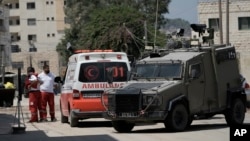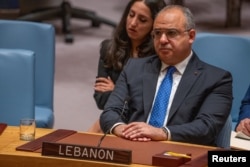Israeli forces launched raids and airstrikes Wednesday in the occupied West Bank, killing at least nine Palestinian militants and surrounding the volatile city of Jenin.
The Israeli military said “large forces” had entered Jenin, long a militant stronghold, as well as Tulkarem and the Al-Faraa refugee camps, which date back to the 1948 Mideast war, all in the northern West Bank.
Lieutenant Colonel Nadav Shoshani, a military spokesman, said Israeli forces killed nine militants, including three in an airstrike in Tulkarem and four in an airstrike in Al-Faraa. He said that another five suspected militants were arrested, and that the raids were the first stage of an even larger operation.
Hamas said 10 of its fighters had been killed in the West Bank fighting, while Palestinian militant groups said they were exchanging fire with Israeli troops.
Israeli forces surrounded Jenin, blocked exit and entry points and access to hospitals, and ripped up infrastructure in the camp, Jenin Governor Kamal Abu al-Rub told Palestinian radio.
The Palestinian Health Ministry in the West Bank said Israeli forces blocked roads leading to a hospital with dirt barriers and surrounded other medical facilities in Jenin. Shoshani said the military was trying to prevent militants from taking shelter in hospitals.
'Complex and combustible'
"This is as complex and combustible a situation as we have seen in many, many years," CIA Deputy Director David Cohen said Wednesday, speaking at a national security and intelligence conference just outside Washington.
Israeli Foreign Minister Israel Katz said Wednesday on the X social media platform, "We must deal with the threat just as we deal with the terrorist infrastructure in Gaza, including the temporary evacuation of Palestinian residents and whatever steps might be required. This is a war in every respect, and we must win it."
Katz also accused Iran of financing and arming militants in the West Bank.
"Iran's is playing a very dangerous game" Cohen said. "I think [it wants] to avoid having this war sort of descend upon Iran. But they are all the while stoking tensions through their proxies in the region."
West Bank raids
Throughout Israel’s 10½-month war against Iran-backed Hamas in Gaza, Israeli forces have repeatedly conducted raids in the West Bank.
Israeli troops and settlers have killed more than 640 Palestinians in the West Bank since the Gaza war began last October, while Palestinian attacks have killed at least 19 Israelis.
Hamas urged Palestinians in the West Bank to rise up, calling the raids part of a larger plan to expand the war in Gaza and blaming the escalation on U.S. support for Israel. The militant group called on security forces loyal to the Western-backed Palestinian Authority, which cooperates with Israel, to "join the sacred battle of our people."
Nabil Abu Rudeineh, a spokesperson for Palestinian Authority President Mahmoud Abbas, condemned the raids as a "serious escalation" and called on the United States to intervene. Abbas later announced he was cutting short a visit to Saudi Arabia and returning to the West Bank, where his government is based.
Meanwhile, the U.S. State Department on Wednesday condemned what it characterized as “extremist [Jewish] settler violence in the West Bank.”
It “causes intense human suffering, harms Israel’s security, and undermines the prospect for peace and stability in the region,” the statement said. “It is critical that the government of Israel hold accountable any individuals and entities responsible for violence against civilians in the West Bank.”
The U.S. sanctioned Israeli nongovernmental organization Hashomer Yosh, which, according to State Department officials, had thwarted the return of Palestinian residents to their West Bank settlement earlier this year.
In response, Prime Minister Benjamin Netanyahu’s office said, “Israel views with utmost severity the imposition of sanctions on citizens of Israel. The issue is in a pointed discussion with the U.S.”
Israel captured the West Bank, Gaza and east Jerusalem in the 1967 Mideast war. The Palestinians want all three for a future state.
Israeli citizens have built scores of settlements across the West Bank, now home to more than 500,000 Jewish settlers. They have Israeli citizenship, while the 3 million Palestinians in the West Bank live under Israeli military rule, with the Palestinian Authority exercising limited control over population centers.
Lebanon front
The U.N. Security Council voted unanimously Wednesday to extend for another year the U.N. peacekeeping force in south Lebanon and called for the restoration of calm along the Israel-Lebanon border region known as the Blue Line.
Clashes between Lebanese Hezbollah and Israel's military along the Blue Line have been frequent throughout the Gaza war, raising fears of a wider regional conflict. The two sides engaged in their largest exchanges in 10 months on Sunday.
Speaking ahead of the meeting, Israeli U.N. Ambassador Danny Danon urged Lebanon's government and people not to let Hezbollah and its patron, Iran, dictate its future.
"Confront Hezbollah today or watch as your country is dragged into chaos and destruction. The time for action is now," Dannon told reporters.
"If you fail to act, the devastation that follows will be on your hands," he added. "Israel does not seek war. But as we demonstrated this week, we will not hesitate to defend our people."
Council members urged the full implementation of the resolution and urged immediate measures toward de-escalation and restoration of calm along the Blue Line.
Gaza peace talks
Top White House Middle East adviser Brett McGurk met with senior Qatari leaders Tuesday in Doha as part of the ongoing push to achieve a cease-fire between Israel and Hamas, which U.S. officials have said is key to quieting overall tensions in the region.
McGurk met with Prime Minister and Foreign Affairs Minister Sheikh Mohammed bin Abdulrahman Al Thani, who held his own talks Monday with Iranian President Masoud Pezeshkian.
Officials from Egypt, Qatar and the United States have led efforts to broker a cease-fire that would include a halt in fighting, the release of hostages still held by Hamas in Gaza, the return of Palestinian prisoners from Israel, and a surge of humanitarian aid for civilians in Gaza.
VOA U.N. Correspondent Margaret Besheer and National Security Correspondent Jeff Seldin contributed to this report. Some information came from The Associated Press, Agence France-Presse and Reuters.






